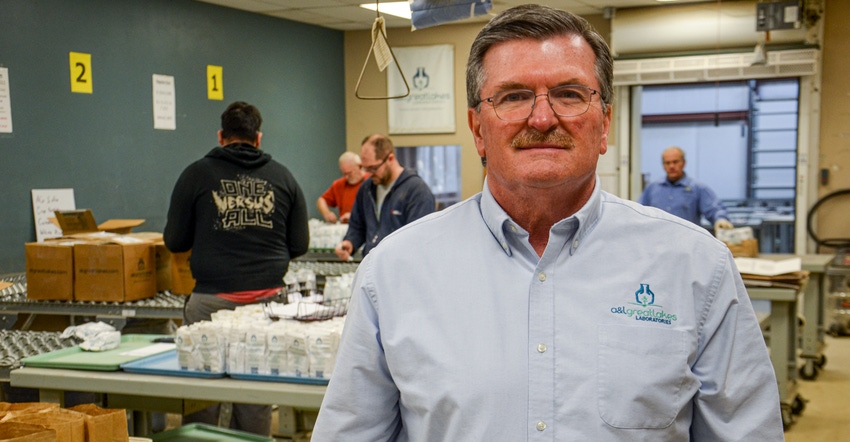
You or someone you hire spends hours pulling soil cores. You put a pound of soil in a bag, mark it, and add it to a box with other 1-pound bags. You ship it to a lab, and a few day later, results show up in your email. You use those results to decide how much fertilizer and lime to apply.
Have you ever wondered who’s on the receiving end of that box of soil samples? Who turns those samples into accurate, reliable results you depend upon?
Meet Randall Warden, president and CEO of A&L Great Lakes Labs, Fort Wayne, Ind. If you use that lab, he’s the guy. If you use another lab, someone like him makes sure you will be making decisions based on sound information.
If you’ve seen “The Wizard of Oz,” you could say Warden is the man behind the curtain. In this case, he’s the man behind the science. He assures people that what the lab does is not magic, and it doesn’t require a wizard. It takes someone who appreciates sound science and who is dedicated to adding the personal touch to make sure results are understandable and meaningful for you.
Beyond soil testing
Warden grew up on a small farm with a cow-calf operation in east-central Tennessee. He learned about ag science at Tennessee Tech and completed a master’s degree at Virginia Tech. He soon found himself working in soil testing labs in Kansas and Nebraska. In 1993, he moved to A&L Great Lakes Labs at Fort Wayne.
Today, he’s not only president and CEO but also majority owner of the company. And while he can discuss the science behind soil or tissue testing with the smartest and most advanced, he hasn’t forgotten his roots.
“We have agronomists and certified crop advisers on staff because we need to explain what we do to customers, whether it’s other agronomists, consultants or farmers,” Warden says. He promotes holding educational programs whenever possible and has assisted behind the scenes in ongoing educational efforts. One of those programs is INfield Advantage, an effort that encourages groups of farmers to test and compare various production practices. Administered by the Indiana State Department of Agriculture, a big part of that program is including scientific principles so people can make valid comparisons.
The Indiana CCAs recognized Warden at their annual meeting in December with the biggest honor the group can bestow. He was named Indiana Certified Crop Adviser of the Year.
“One thing we like to do here is invite customers to come in and talk to us,” Warden says. “It’s a reason why we included meeting rooms in a testing lab.
“Maybe you’re trying to set up your own soil testing program from scratch. Or maybe you’re puzzled why this year’s sampling results don’t line up with samples from the same fields three years ago. Our door is always open. We love to share our expertise. Maybe together we can figure out a solution.”
About the Author(s)
You May Also Like




